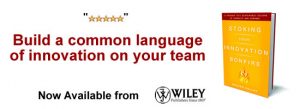Innovation Perspectives – Future Working Relationships
This is the fifth of several ‘Innovation Perspectives‘ articles we will publish this week from multiple authors to get different perspectives on ‘Thinking about the future: what big innovation do you expect within 10 years?’. Here is the next perspective in the series:
by Jose Mello
 I believe that we are getting closer to the tipping point of a dramatically change in working relationships between companies and employees. The popularization of new technologies and the terrific growth of accessibility and communication have created new ways of learning and new kinds of professions that didn’t even existed five years ago.
I believe that we are getting closer to the tipping point of a dramatically change in working relationships between companies and employees. The popularization of new technologies and the terrific growth of accessibility and communication have created new ways of learning and new kinds of professions that didn’t even existed five years ago.
What if we didn’t have jobs anymore? What if we were the owners of our own independent companies working one to each other as partners rather than employees?
Imagine a future where people are going to become more educated by themselves rather than by schools and universities. The knowledge is going to be embedded into software and will be used in such simple ways that scientific and technical knowledge will be reserved only to very high level researchers who are going to become specialists in developing those new technologies. Regular people will create their own business models everyday just using simple and smart communication skills and technologies that could be used in their day to day activities. Do you remember that around ten years ago, to have a website, a company should hire an IT company to have it developed and nowadays everyone can have a sophisticated website with just one click?
What if you didn’t have a boss anymore, just clients and partners?
Young people who just starting their careers are not used to the hierarchical structure we were used to live in. Starting at home, where was unimaginable to discuss something with your parents 10 years ago. So, to this new generation of people, it´s impossible to accept that they need to do what they are told to do, just because the other “guy†is their boss.
What if we didn’t need to buy anything, just have access to it whenever we need?
Jeremy Rifkin wrote a book about 10 years ago called The Age of Access, predicting this shift and giving some examples of how the world is moving toward this concept, just like the car sharing services or the software as services companies created in the past years. He also wrote a book in 2004 called The End of Work, where he explored the idea that technology would substitute human work in software factories and mass production in the next years.
All trends Jeremy Rifkin describe in his books seem to become reality and even go beyond, what makes me think that we are not far from this world I described above.
The only certainty we can have is that things are going to change, even quicker than it used to change in the past. So, get prepared because the future is beginning today.

You can check out all of the ‘Innovation Perspectives‘ articles from the different contributing authors on ‘Thinking about the future: what big innovation do you expect within 10 years?’ by clicking the link in this sentence.
 Jose Mello is a teacher, speaker and a specialist in innovation management at Itau Unibanco Bank, in Brazil.
Jose Mello is a teacher, speaker and a specialist in innovation management at Itau Unibanco Bank, in Brazil.
NEVER MISS ANOTHER NEWSLETTER!
LATEST BLOGS
Starbucks and Big Tobacco
Back in the 1950’s smoking was glamorous, and just about everybody who was anybody smoked cigarettes. Then came the discovery, to the shock of millions, that sucking smoke into your lungs might not be good for you. Then came another revelation that one of the substances in tobacco, nicotine, which was used as a poison by the Egyptians during the times of the Great Pyramids, is addictive. People then began a mass exodus from the consumption of nicotine via inhaled smoke.
Read MoreWal-Mart Goes Green – What about your company?
With the price of gas above $3.00, some companies (and hopefully all) are beginning to look at the fuel efficiency of their fleets. Wal-Mart is the most public example of this with its trucking fleet. Its efforts include:
Read More


